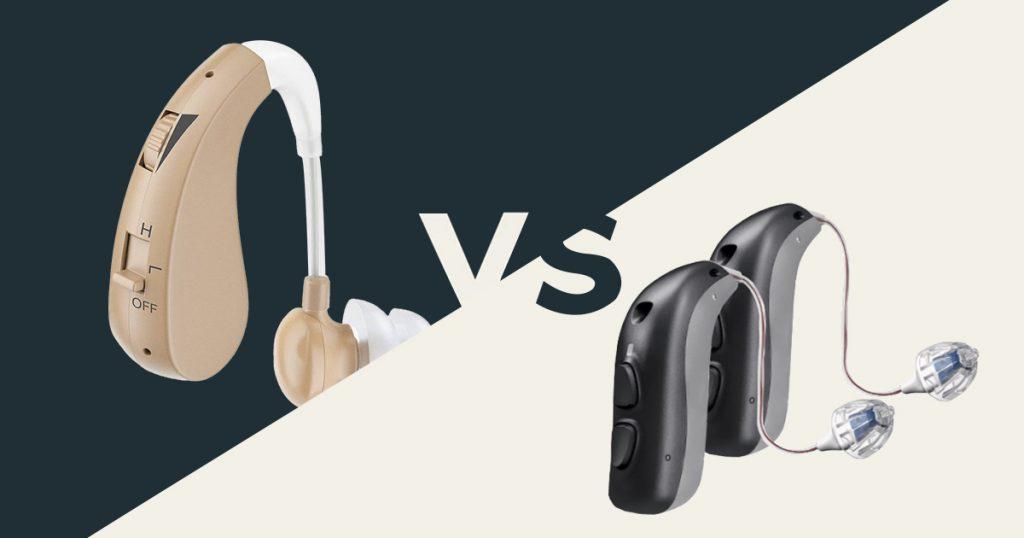Do you have trouble hearing people, especially when there’s a lot of noise around? It’s not just you. Many people all over the world have trouble with hearing loss. While modern technology offers various solutions, two popular devices stand out: hearing amplifiers and hearing aids. Understanding the difference between hearing amplifiers and hearing aids is crucial for deciding which might best suit your needs.
What are hearing amplifiers?
Personal sound amplification products (PSAPs), also known as hearing amplifiers, are made to boost sounds in the surroundings. They are often sold as less expensive alternatives to hearing aids. People with mild to moderate hearing loss or who want to improve their hearing in particular situations, such as birdwatching or attending a lecture, frequently use hearing amplifiers.
How do hearing amplifiers work?
Hearing amplifiers work by taking in sound with a microphone, making it louder, and sending the louder sound to the ear. The users can change the volume level. However, hearing amplifiers amplify all sounds, including background noise, which can sometimes be too much.
Many people wonder if using hearing amplifiers can damage your hearing. Although hearing amplifiers are not usually dangerous, misusing them can cause problems. For instance, turning up the volume too loudly can damage your hearing or make you uncomfortable. It’s crucial to use hearing amplifiers at a volume that feels comfortable and safe to prevent any potential harm.
What are hearing aids?
People with mild to serious hearing loss can use hearing aids to improve their understanding and speaking. Based on a comprehensive hearing assessment, audiologists or hearing specialists prescribe and fit them.
Hearing aids can improve life and help people feel less isolated. However, according to the National Institute on Deafness and Other Communication Disorders, only six percent of people aged 20 to 69 who require hearing aids use them. This represents less than one-third of the population above the age of 70.
How do hearing aids work?
Hearing aids use a microphone to capture sound, which is then digitally processed to amplify specific frequencies before being delivered to the ear. Today, hearing aids use advanced technology to tell the difference between words and background noise, making listening clearer.
Hearing aids are an excellent option for people with severe hearing loss or who require consistent hearing assistance. They have more advanced features and better sound quality and can be changed to fit each person’s needs.
What are the differences between hearing amplifiers and hearing aids?
Understanding the differences between hearing amplifiers and hearing aids can help determine which device best suits your needs.
1. Purpose and Design
- Hearing Amplifiers: Designed to amplify all sounds, hearing amplifiers are typically used for recreational purposes or in specific situations. They are not intended to address hearing loss but to enhance overall sound perception.
- Hearing Aids: Specifically designed to treat hearing loss, hearing aids are customized based on the user’s hearing profile. They focus on improving speech clarity and reducing background noise.
2. Customization and Adjustability
- Hearing Amplifiers: Hearing amplifiers generally offer limited customization. Users can adjust the volume, but cannot fine-tune the device to enhance specific frequencies.
- Hearing Aids: Hearing aids offer extensive customization options. Audiologists can program the device to match the user’s unique hearing loss profile and adjust the settings to improve performance in different environments.
3. Technology and Features
- Hearing Amplifiers: Hearing amplifiers usually don’t have high-tech features like directional mics, noise reduction, or feedback cancellation.
- Hearing Aids: Modern hearing aids have advanced features, including digital sound processing, noise reduction, directional microphones, and Bluetooth connectivity. These features improve listening overall and help hearing aids work better for people who have trouble hearing.
4. Regulatory Standards
- Hearing Amplifiers: Hearing aids are not controlled like medical devices are. You don’t need a prescription to buy them; you can do it without one.
- Hearing Aids: According to the Food and Drug Administration (FDA), a hearing aid is a class 1 medical device. It requires a prescription and fitting by a qualified hearing specialist.
5. Cost
- Hearing Amplifiers: Hearing amplifiers are generally more affordable than hearing aids. Their prices range from $50 to $1000, making them an attractive option for individuals on a budget.
- Hearing Aids: Hearing aids cost more because they use more modern technology and can be made to fit each person. Prices for each device can be anywhere from $1,000 to $6,000, based on its features and how much it can be customized.
Hearing Aids vs. Hearing Amplifiers: Choosing the Right Device
Selecting a suitable hearing device is crucial for improving your hearing and quality of life. Here are some key factors to consider:
- Degree of Hearing Loss: Hearing aids are recommended for moderate-to-severe hearing loss, while hearing amplifiers can help with mild difficulties.
- Lifestyle and Specific Needs: Assess your daily activities and environments where you need hearing assistance.
- Budget and Affordability: Hearing aids are a long-term investment, whereas hearing amplifiers are more budget-friendly.
- Professional Advice and Fitting: Consult an audiologist to determine the best option for your hearing needs.
When to choose hearing aids?
Hearing aids are ideal for a customized solution with advanced features and professional support. They offer better sound quality and comfort, especially for those with significant hearing loss.
When to choose hearing amplifiers?
Hearing amplifiers are suitable if you need a simple, affordable solution for mild hearing difficulties. They are easy to use and can enhance your hearing in specific situations without needing professional fitting.
Hearing Aids vs. Hearing Amplifiers: Making the Right Choice
Selecting a suitable hearing device is crucial for improving your hearing and quality of life. Hearing amplifiers work well in some situations and for people with low to moderate hearing loss. Hearing aids are suitable for different levels of hearing loss and offer advanced features It’s vital to assess your needs and consult a professional to find an appropriate device.
